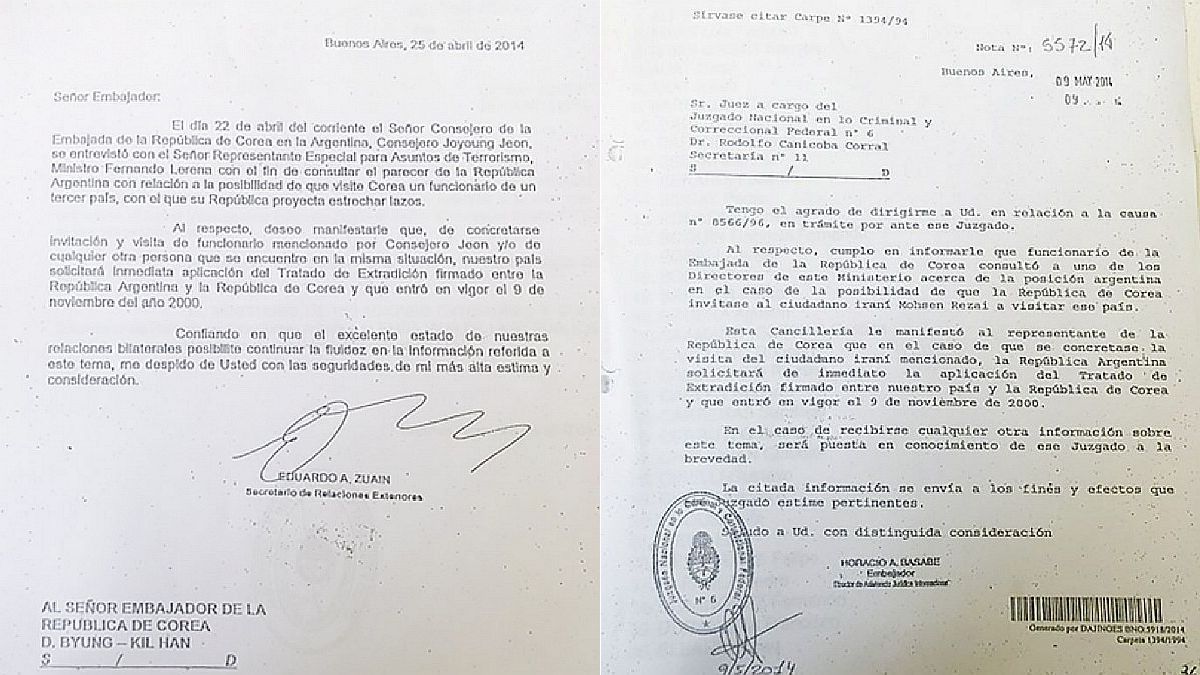
[ad_1]
The document corresponds to a response that the Ministry of Foreign Affairs in charge Hector Timerman gave Korea before a question relating to the will of this country to formalize an invitation to the Iranian official Moshen Rezai, who had been commander of the Iranian Revolutionary Guards, accused in the case of the attack on the Jewish mutual, who at the time looked like a candidate for the presidency of the Islamic nation.
The documentation to which Telam had access, has been presented as evidence for the trial in which the complaint of the late AMIA prosecutor, Alberto Nisman, will be heard, in 2015, who argued that the memorandum signed in January 2013 between Argentina and Iran aimed to give impunity to the defendants in return for the bailout of trade relations with the Persian country.
<< I want to tell you that if the invitation and the visit of the aforementioned official and / or any other person in the same situation take place, our country will ask for the immediate application of the extradition treaty signed between the Republic of Argentina and the Republic of Korea and which entered into force on 9 November 2000 ", indicates the response dated in Buenos Aires on April 25, 2014 and signed by the then Deputy Foreign Minister and current Ambassador to Russia, Eduardo Zuain.
This is a response that the Ministry of Foreign Affairs sent to South Korea in Argentina following a request from the consul general of this diplomatic headquarters, Joyoung Jeon, who was special representative for terrorism cases, Fernando Lerena.
The saga began on April 23, 2014 when Jeon met Lerena and revealed that, given the improvement in bilateral relations between the United States and Iran, the Republic of Korea wanted “take a step forward to support this rapprochement, by improving its own bilateral relations with Iran”, as reflected in a confidential Chancellery document.
At this meeting, Jeon announced that his country intends to invite the Iranian official Moshen Rezai and that he is concerned about Argentina’s reaction to this invitation, given that an extradition treaty between the two countries has been in force since 2000 and the aforementioned Iranian citizen weighs heavily. Red alert Interpol requested by the Argentine judicial authorities in the context of the AMIA case.
After setting out Argentina’s position in writing, the Foreign Ministry notified the situation to the Federal Court 6, then in charge of the now retired judge. Rodolfo Canicoba Corral, which were also anticipated that “in case any further information on the subject is received” was going to be put “in knowledge” of this courtyard “soon”.
The accused of the terrorist attack against AMIA (perpetrated in 1994, with 85 dead) against those who weigh the red circulars are Mohsen Rabbani (former cultural attaché of the Iranian embassy in Buenos Aires), Ali Fallahijan (former minister of intelligence), Mohsen Rezai (commander of the Iranian Revolutionary Guard), Ahmad Reza Asghari (third secretary of the Buenos Aires embassy) and Ahmad Vahidi (former Iranian Minister of Defense).
[ad_2]
Source link
 Naaju Breaking News, Live Updates, Latest Headlines, Viral News, Top Stories, Trending Topics, Videos
Naaju Breaking News, Live Updates, Latest Headlines, Viral News, Top Stories, Trending Topics, Videos
